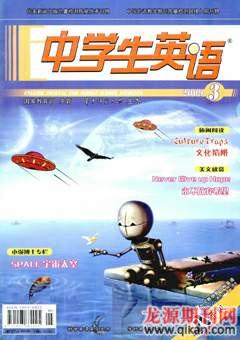大嘴解疑
Q:大嘴叔叔,能讲讲alone和 lonely这两个词在用法上有什么不同吗?
A: alone既可用作形容词,也可用作副词,意为“单独的/地;独立的/地”。用作形容词时,习惯上只用作表语,在意义上侧重于“一个人独处“,并不指心灵上的孤独。例如:
The old man lives alone. 那位老人独自生活。
lonely意为“孤独的;寂寞的”,有较浓厚的感情色彩,指因缺少朋友、同情、友谊时产生的一种悲伤和忧郁的感情。例如:
Im alone, but I dont feel lonely. 我独自一个人,但不感到孤单。
Q: dress, put on, wear和介词in都可以表示“穿“的意思,它们在使用上有什么异同呢?
A: dress可指穿衣服的动作,用作不及物动词时,意为“穿好衣服”;用作及物动词时,后面要接sb.,意为“给某人穿衣服“。例如:
She washed, dressed and went out. 她洗完脸,穿好衣服就出去了。
My daughter is old enough to dress herself. 我的女儿长大了,可以自己穿衣服了。
dress也可以指“穿着衣服”的状态。例如:
She always dresses in red. 她总是穿红色的衣服。
He dresses well. 他穿得体面。
put on意为“穿上;戴上”,强调穿戴这一动作。例如:
This is your new shirt. Put it on, please. 这是你的新衬衣。请把它穿上。
wear意为“穿着;戴着”,强调穿戴的状态。例如:
She is wearing a red coat today. 今天她穿着一件红色的外套。
in是介词,也可以用来表示“穿着;戴着”,be in 相当于be wearing。“in+表示颜色的词”可以用来表示穿某种颜色的衣服。例如:
The girl in the hat is Lucy. 戴着帽子的女孩是露西。
She is in white today. 今天她穿着白色的衣服。
Q: besides, except, except for都意为“除外”,遇到不同的语境,我该怎么用呢?
A: besides 意为“除……外,还有……”,表示一种递加的概念。例如:
There are three more visitors besides me. 除了我之外,还有三名参观者。(即共有四名参观者)
except意为“除……外,不再有……”,表示一种递减的概念。例如:
We go to school every day except Sunday and Saturday. 除了周末以外我们每天上学。(即周一至周五上学)
except for与except的用法有所不同,except主要用来谈论同类事物,而except for则用来谈论不同类事物。例如:
We go there every day except Sunday. 除了星期天以外,我们每天都去那儿。(every day 和Sunday都表示时间)
We had a pleasant time, except for the weather. 我们玩得很痛快,只是天气不太好。(time表示时间,而weather表示天气)
Q: 在电影里,我常听到shut up(闭嘴),请问动词shut和close用法上有什么不同之处?
A: close 通常指把开着的东西关闭起来,是较为正式的用语。其反义词是open。例如:
If you close your eyes, you cant see anything. 如果把眼睛闭上,你就什么也看不见了。
Close the door, please. 请把门关上。
shut 比close表达的意思更强烈些。比如说close the door 意为“把门关上”, shut the door则指用门闩关住不让人出入,有“隔绝内外”的意思。例如:
She shut the drawer and locked it. 她关上抽屉并上了锁。

